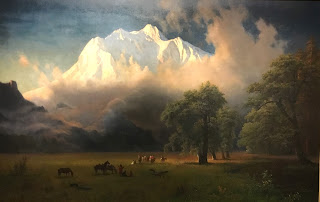The art should be seen in the environment of the museum, and the spectacular way in which the PEM has organized the art. It is a masterpiece of curating.
 |
Pacific Northwest Coast, probably Haida
Rattle, 19th. century
PEM
|
 |
Diego de Vlaldes (Didacus Valades) 1533-1582
Illustration of the Great Chain of Being, in "Rhetorica Christiana" 1579
I will have to do some research on this.
|
 |
John James Audubon 1785-1851
Carolina Parrot
from "The Birds of America"
PEM
This species is extinct.
|
 |
Pemonscot artist
Powder horn, before 1815
PEM
|
 |
Oliver admiring:
Charles Willson Peale 1741-1827
George Washington at the Battle of Princeton
|
 |
Thomas Cole 1801-1848
A View of the Mountain Pass Called
the Notch of the White Mountains
(Crawford Notch)
National Gallery of Art, Washington, D.C.
|
 |
| detail of above |
 |
Thomas Moran 1857-1925
Lower Falls, Yellowstone Park
Gilcrease Museum, Tulsa, Oklahoma |
 |
Frederic Edwin Church 1826-1900
Cayambe
New York Historical Society
|
 |
| detail of above |
 |
| detail of above |
 |
| detail of above |
 |
Martin Johnson Heade
Newburyport Marshes, Approaching Storm
|
 |
Albert Bierstadt
Bridal Veil Falls, Yosemite
North Carolina Museum of Art, Raleigh
|
 |
Frederick Law Olmsted 1822-1903
Calvert Vaux 1824-1895
Greensward Plan for Central Park
New York City Municipal Archives
Like the Linnaeus, how very cool to see an Olmsted original
|
 |
David Gilmour Blythe 1815-1865
Prospecting
Westmoreland Museum of American Art, Greensburg, Pennsylvania
|
 |
James Hamilton 1819-1878
Burning Oil Well at Night, near
Rouseville, Pennsylvania
Smithsonian Art Museum, Washington, D.C.
|
 |
Thomas Moran 1838-1926
Slave Hunt, Dismal Swamp, Virginia
Philbrook Museum of Art, Tulsa
What a stunning, and surprising piece of art by Moran, most famous for his landscapes.
|
 |
| detail of above |
 |
George Bellows 1882-1925
Cliff Dwellers
Los Angeles County Museum of Art
Bellows' gritty art is so powerful and riveting.
|
 |
David Bradley born 1954 Ojibwe
American Dream II
PEM
|
 |
Artist in Michigan
Men Standing with Pile of Buffalo Skulls,
Michigan Carbon Works 1892
Detroit Public Library
|
 |
Lakota artist
Buffalo robe, 1882
Univ. of Pennsylvania Museum of Archeology and Anthropology
|
 |
Georgia O'Keefe 1887-1986
The Lawrence Tree
Wadsworth Atheneum Museum of Art, Hartford
|
 |
A:shewi (Zuni Pueblo) artist
Jar, before 1900
PEM
|
 |
Morris Louis
Intrigue
Princeton Univ. Art Museum
|
 |
Alexander Hogue 1898-1994
Crucified Land
Thomas Gilcrease Foundation
|
 |
Dorothea Lange 1895-1965
Ex-Tenant Farmer on Relief Grant
in the Imperial Valley, California
Princeton Univ. Art Museum
|
 |
Three generations of Wyeths, exhibited side by side
N.C. Wyeth 1882-1945
Roping Horses in the Corral
Private Collection
|
 |
Andrew Wyeth 1917-2009
My Hound
Private Collection
|
 |
Jamie Wyeth born 1946
Portrait of Lady, Study #1
Private collection
|
 |
| detail of above |
 |
| detail of above |











No comments:
Post a Comment